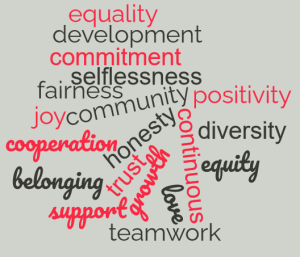


This is the last blog entry on the C’s system and I already have a few ideas in mind for the next blog posts.
Covering the C’s system with blogs took a bit longer than originally planned, but studies, work projects and plain life came in the way.
I am currently working on a project for the International Ice Hockey Federation (IIHF) on Abuse and Harassment. A key point in this project is the IIHFs aim at impacting the coaching culture in ice hockey. A key tool for this is the implementation of the C’s system in coaching. I was fortunate to have been able to attend the IIHF Coaching Symposium in Tampere, Finland, this year where Jean Côté was speaking. For the one’s who have not yet heard this name, go and check his publications on coaching effectiveness and the C’s in coaching, because yes, he can be called one of the fathers of the C’s system, together with Wade Gilbert. He emphasized that coaches who implement the C’s in their coaching are making better people; and that is after all the business we coaches and coach developers are in, the business of helping the people we are working with to become the best version of themselves.
But coming to the last C to cover in this blog – character.
The Merriam-Webster dictionary defines character as:
‘a person or individual displaying moral excellence and firmness’ and ‘the complex of mental and ethical traits marking and often individualizing a person, group, or nation’
Of course, character means also all sorts of other things, but the two definitions just mentioned are the ones we are looking for in this case.
So how can a coach influence the building of character in their sport participants?
First of all, coaches function as role models, and in this capacity the way each of us behaves, talks, acts and interacts, builds connections and makes decisions is emulated by the sport participants we work with. This is especially the case the younger the sport participants are that we are in contact with during our training sessions and competitions.
If we emphasize fair play, taking on personal responsibility for our decisions, coach values, interact in a respectful manner with the people around us, have a well-developed work ethos, know our strengths and weaknesses, put importance on team work, and respect the referees, opponents, the rules, the team, the equipment and sport facility, and others around us, we will support the development of sport participants who have character.
These sport participants will know right from wrong, will support and assist others, stand by their mistakes and correct them, will interact respectfully with others and will know that winning and losing are part of the sport.
So, if some of the following values (and the list is much longer than the ones shown here) are part of your coaching philosophy, then you are on the best way of being a role model who unites the C’s in their practice and so creates positive and effective sport environments, with a holistic, person-centred coaching approach.
Additional literature references can be found in the other blogs of this C’s system blog series.
